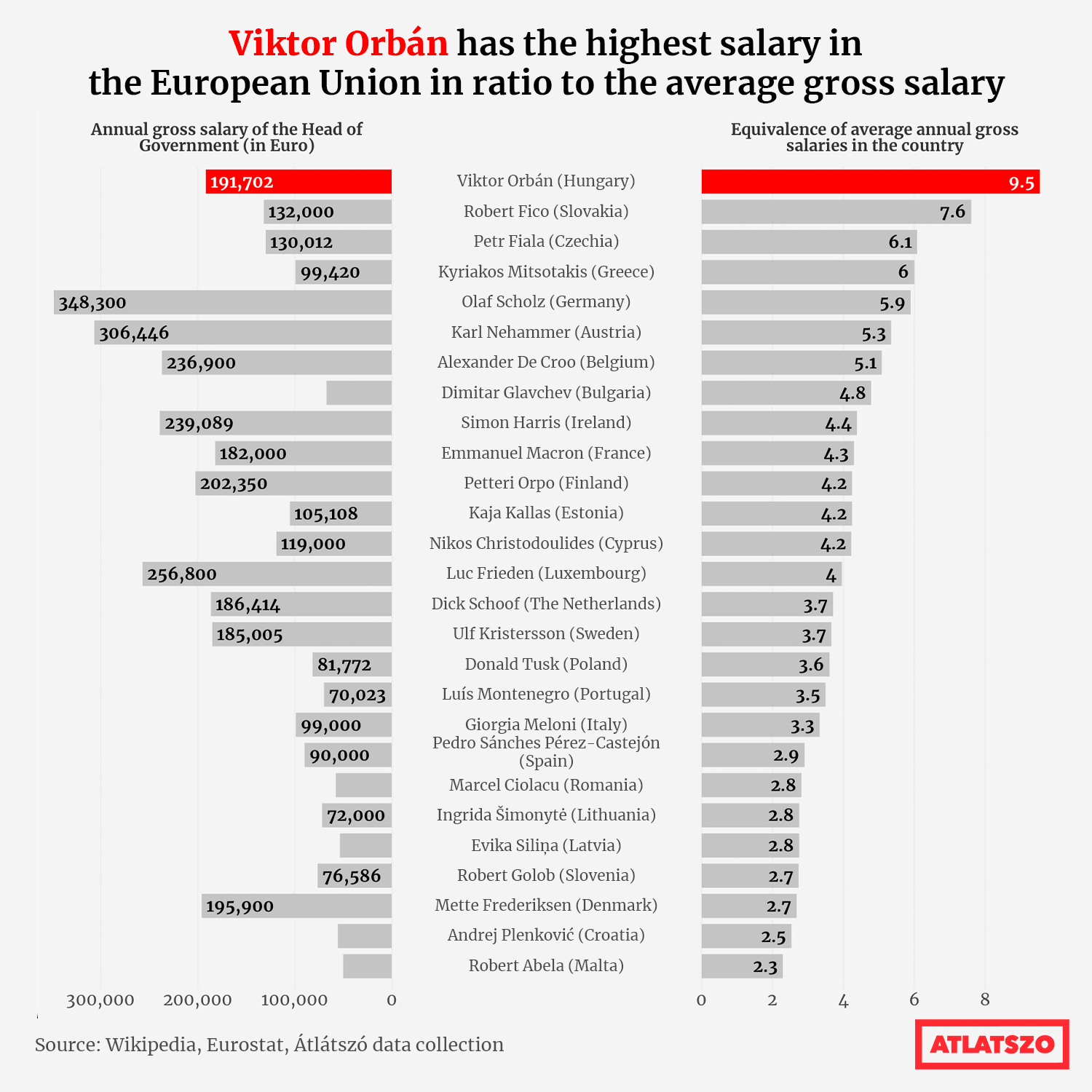The https://english.atlatszo.hu use cookies to track and profile customers such as action tags and pixel tracking on our website to assist our marketing. On our website we use technical, analytical, marketing and preference cookies. These are necessary for our site to work properly and to give us inforamation about how our site is used. See Cookies Policy
Viktor Orbán has the highest salary in the European Union in ratio to the average gross salary
In the European Union, Hungary has the highest salary for the head of government in relation to the average gross salary of the country’s population. Viktor Orbán’s salary has risen to a gross HUF 6.3 million (~€16,000) a month this year, which means that he receives 9.5 times the average Hungarian salary every month. Orbán earns twice as much as the Spanish PM and three times as much as the Bulgarian PM.
In terms of salary alone, Viktor Orbán is not the highest paid in the EU: seven European heads of government earn more than him. The highest is that of the German Chancellor, Olaf Scholz, who earns €348,300 gross a year, or around €29,000 a month. But this amount is not particularly high compared to other German public leaders: the head of the German state railway company, for example, received more than €2.2 million in 2022, about six times as much as the chancellor.

Scholz’s salary is still among the most disproportionate in the EU, with the German chancellor earning 5.9 times the average German salary.
The lowest salary is that of the Bulgarian prime minister, who earns €67,452 gross a year, roughly a third of the salary of Viktor Orbán. However, this is still high compared to the average salary of the Bulgarian population: the head of government earns 4.8 times as much as the average Bulgarian.
But compared to the average salary, Orbán’s salary takes first place, with a multiplier of almost 10.
The Hungarian prime minister is followed by his Slovak counterpart, Robert Fico, whose salary is 7.6 times the national average. In Slovakia, following the attempted assassination of Fico, a new law, which came into force on 15 July, partially restricts freedom of assembly and provides for a lifetime salary for heads of government who have served more than two full election cycles – this currently only applies to Fico.
In third place is Czech Prime Minister Petr Fiala, who, although he earns almost as much as Fico, receives 6.1 times the average Czech salary.
The smallest difference between the earnings of an average citizen and the head of government is in Malta, where the PM earns just 2.3 times more than the average gross salary. But Croatia is not far behind: the Croatian head of government earns 2.5 times the average salary.
Orbán earns almost as much as the Danish Prime Minister, who earns just €4,200 more than him a year. But in Denmark, the amount is significantly more proportional: only 2.7 times more than the average Danish salary. The same pair of ratios can be observed in Slovenia, where the head of government earns 2.7 times more than the average. However, the gross annual salary of the Slovenian Prime Minister is €76,586, which is €115,000 less than of Viktor Orbán.
The situation is similar for Poles: the salary of Donald Tusk is less than half than of the Hungarian Prime Minister (€81,772), which also results in a more balanced ratio: the Polish Prime Minister earns 3.6 times more than the average salary.
In 20 out of the 27 EU Member States, the difference between the average salary and the salary of the head of government is less than a factor of five,
which is why it can be considered outstanding that the difference in Hungary is almost tenfold. In addition, in 8 countries the head of government earns less than three times the average salary. To put in perspective, the gross salary of a Member of the European Parliament is €124,529 per year, €66,000 less than Orbán’s, but more than, for example, the Italian, Spanish or Estonian heads of government.
Of all the countries, the highest – declared – salary by far is that of the Prime Minister of Singapore: almost €1.5 million a year, converted into euros. Then comes Hong Kong, followed by Switzerland, a European but non-EU country. The US president’s salary is a fixed amount of $400,000 a year (almost the same if converted to euros), set by Congress in 2001. Germany is ranked sixth in the world.
Viktor Orbán did not always earn this much. The Prime Minister’s salary remained unchanged between 2010 and 2022: HUF 1,507,000 gross per month (€3,857 in today’s exchange value). But this is not the only component of Orbán’s salary. In addition to his honorarium, he also receives the salary of an MP, which has been increased many times since 2010. Until 2014 it was 231,900 HUF (€600), but after the parliamentary elections of that year it was increased significantly. The basic salary of the MP more than tripled, to HUF 747,878 per month (€1,914).
After the next election in 2018, this amount was increased again to HUF 891,000 per month (€2,280). In addition, this was the year when a law was enacted to connect the salary of MPs to the average income of the population, declaring it to be three times the average gross salary. The law also states that if the average salary were to fall, the figure for the previous year would be taken into account when calculating the salary of MPs.
However, in 2022, not only the salary of MPs but also the Prime Minister’s salary was significantly increased, to the same level as the salary of the speaker, to HUF 3.5 million gross (€8,960). Thus, in 2022, the Prime Minister’s total salary became HUF 4.8 million (€12,288).
As the average gross salary in 2023 was HUF 571,000 (€1,461), the basic monthly salary of MPs increased to HUF 1.71 million (€4,383) in 2024. However, Viktor Orbán’s salary is more than 3.5 times higher: combining the MP’s salary and the Prime Minister’s salary, it totalled to HUF 6.3 million (€16,128) by 2024. As a result, he now earns almost 10 times more than the average Hungarian worker.
Translated by Krisztián Szabó. The original, Hungarian version of this story was written by Dávid Háberman and Krisztián Szabó and can be found here. Cover image: Prime Minister Viktor Orbán arrives in Brussels on 1 July 2024 to take over the Presidency of the European Council for the next six months. Source: MTI/Prime Minister’s Press Office/Fischer Zoltán
Share:
Your support matters. Your donation helps us to uncover the truth.
- PayPal
- Bank transfer
- Patreon
- Benevity
Support our work with a PayPal donation to the Átlátszónet Foundation! Thank you.
Support our work by bank transfer to the account of the Átlátszónet Foundation. Please add in the comments: “Donation”
Beneficiary: Átlátszónet Alapítvány, bank name and address: Raiffeisen Bank, H-1054 Budapest, Akadémia utca 6.
EUR: IBAN HU36 1201 1265 0142 5189 0040 0002
USD: IBAN HU36 1201 1265 0142 5189 0050 0009
HUF: IBAN HU78 1201 1265 0142 5189 0030 0005
SWIFT: UBRTHUHB
Be a follower on Patreon
Support us on Benevity!


